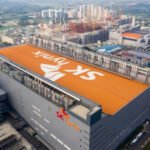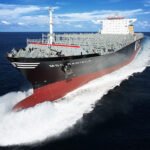Korea offers returning companies incentives and tax benefits under the Reshoring Act introduced in 2014
Reshoring, or a corporate U-turn to the home country from an overseas location, has been the global trend since the outbreak of the COVID-19 pandemic amid the escalating US-China trade conflict.
Governments around the globe offered generous incentives and tax breaks to welcome their companies back home, resulting in growing numbers of companies creating jobs in their home countries.
However, industry data showed that the number of such reshoring companies is unimpressive in Korea due to “little carrots” to entice them back home.
According to the Ministry of Trade, Industry, and Energy data obtained by Koh Dong-jin, a ruling People Power Party lawmaker, only 20 Korean companies per year, on average, returned to Korea over the past five years.
Most of them were small- and medium-sized enterprises (SMEs), with only four large companies making the move.
President Yoon Suk Yeol looks at a photomask used to produce a pattern on a substrate or a wafer, during a cabinet meeting
In 2019, only 14 companies transferred their operations back home from overseas locations. The number of reshored companies increased to 23 in 2020 and 25 in 2021, influenced by the COVID-19 pandemic. However, the trend reversed with numbers falling to 24 in 2022 and 22 in 2023, totaling 108 firms over the past five years.
The Korean government introduced the “Reshoring Support Strategy 2.0” in May, offering up to 40 billion won ($30 million) per company in U-turn support. But only 13 companies were chosen as reshoring firms as of August, with none being large corporations.
If this trend continues, the annual number of reshoring companies could drop below 20, industry officials said.
CASES IN JAPAN, US & EUROPE
In contrast, neighboring Japan sees a growing number of big companies return annually.
In June 2023, Panasonic moved its air conditioner production base from Guangzhou, China to its Kusatsu plant in Shiga Prefecture, Japan.
Other large companies such as Toyota Motor, Honda, Yaskawa Electric, Subaru and Canon have also reshored.
US President Joe Biden signs H.R. 4346, the CHIPS and Science Act of 2022
Data showed some 600 to 700 Japanese companies return home annually, exceeding the total 151 Korean companies back home over the past decade.
The US has seen a significant return of manufacturers since former President Barack Obama launched the “Remaking America” reshoring initiative in 2010.
A total of 3,327 companies returned to the US between 2011 and 2019, averaging 369 firms annually. In 2021 alone, 1,844 companies came back.
Besides, the US is attracting global manufacturing plants with laws such as the Inflation Reduction Act (IRA) and the CHIPS and Science Act.
The European Union also offers generous subsidies to reshoring companies.
MORE FAVORABLE CONDITIONS REQUIRED
Although the Korean government continues to expand support for reshoring companies to strengthen its supply chain, returning companies are fewer than expected, industry officials said.
Korea is home to the world’s two largest memory chipmakers
Experts said Korea’s relatively small market size and high labor costs are major hurdles. They urge the government to create a more favorable business environment in terms of employment and infrastructure.
“In a global race to attract manufacturing plants, Korea faces challenges due to its smaller domestic market. To encourage reshoring, the government needs to drastically ease regulations to create a more business-friendly environment in addition to incentives,” said lawmaker Koh, who previously was a senior Samsung Electronics Co. executive.
CURRENT REGULATIONS
The Korean government has been offering incentives and tax benefits under the Reshoring Act introduced in 2014.
Currently, reshored companies are fully exempted from corporate taxes for seven years and receive a 50% tax cut in the following three years.
In reality, however, reshored companies have received just 2 billion won in total tax benefits over the past five years. Most of the 416.7 billion won in state aid during the period was in the form of investment subsidies, which reached 408.6 billion won.
LG Chem’s cathode plant in Cheongju, North Chungcheong Province
Among the four large companies that have reshored, publicly known firms are Hyundai Mobis Co. and LG Chem Ltd.
Hyundai Mobis stopped its Chinese auto parts plant and returned to Korea in 2019, while LG Chem announced in 2022 that it would build a biodegradable bioplastic plant in Korea, reversing an earlier plan to build one overseas.
To further promote reshoring, experts suggest that not only incentives but also regulatory reforms, such as easing restrictions on operating in the Seoul metropolitan area, are necessary.
According to the International Institute for Management Development (IMD)’s world competitiveness ranking released in July, Korea ranked 47th out of 67 countries in business conditions and 39th in government efficiency.
“Last year, 2,816 Korean companies went overseas through foreign direct investment – over 100 times the number of reshored companies. We need to seriously assess whether Korea’s business environment is attractive enough for companies to return and reinvest after leaving China and other foreign countries,” said Koh, the ruling party lawmaker.
By Jung-hwan Hwang and Yeong-Hyo Jeong
jung@hankyung.com
In-Soo Nam edited this article.















